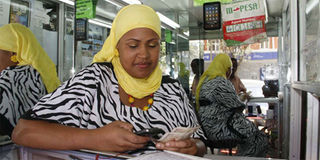Kenya makes gains in women financial inclusion, says WB

A Safaricom agent transacts on the M-Pesa money transfer service. FILE PHOTO | NMG
What you need to know:
- The study titled the World Bank Group’s Women, Business and the Law 2018 report, released Friday shows that Kenya enacted its first domestic violence law, which protects family members, current and former spouses and partners from physical, sexual, psychological and economic abuse.
Kenya is among four African economies in five globally that carried out multiple reforms during the past two years that have boosted women’s financial inclusion.
This is according to a new World Bank study that shows the country made progress in enacting laws that promote equality between men and women.
The study titled the World Bank Group’s Women, Business and the Law 2018 report, released Friday shows that Kenya enacted its first domestic violence law, which protects family members, current and former spouses and partners from physical, sexual, psychological and economic abuse.
“Kenya also now provides legal aid in civil matters and has improved access to credit information by distributing data from two utility companies that report positive and negative payment information,” notes the study.
Besides Kenya, the Democratic Republic of Congo, Tanzania, and Zambia also collectively carried out 13 reforms during the period to remove legal barriers to women’s economic inclusion.
“Progress in sub-Saharan Africa is heartening. Despite the myriad challenges facing the region, many governments are working to rescind laws, often holdovers from the colonial era, that discriminate against women,” said Sarah Iqbal, programme manager of the Women, Business and the Law project.
“We believe that if you change the law, you change the world and we look forward to recording further progress on women’s economic inclusion in Sub-Saharan Africa.”
Despite the gains, the report warns however that women continue to face widespread legal barriers in Sub-Saharan Africa and other parts of the world, “that keep them out of jobs and prevent them from owning a business.”
The biennial report, monitors 189 economies globally, including 47 in sub-Saharan Africa.
“For example, in economies such as Equatorial Guinea, where the 1960 Spanish Civil Code is still in force, a woman needs her husband’s permission to sign a contract.
Similarly, Chad, Guinea-Bissau and Niger still rely on colonial versions of civil laws that do not allow married women to open bank accounts without their husband’s permission,” observes the report.




